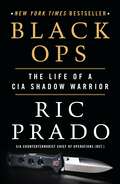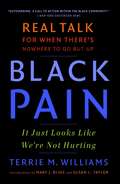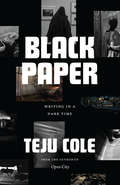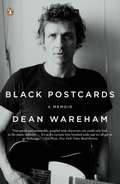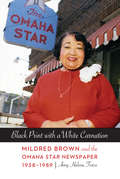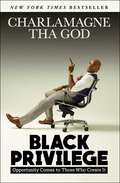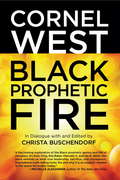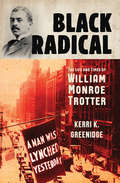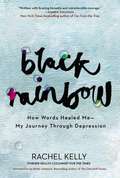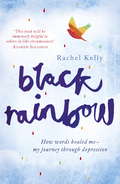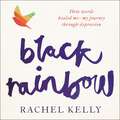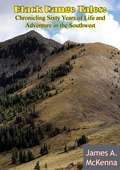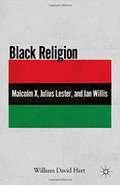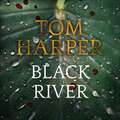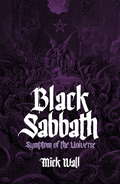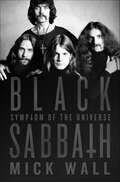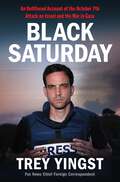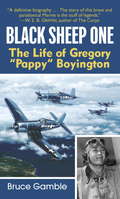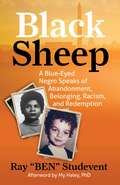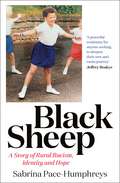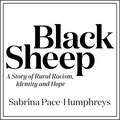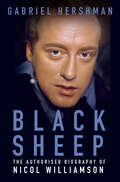- Table View
- List View
Black Ops: The Life of a CIA Shadow Warrior
by Ric PradoA memoir by the highest-ranking covert warrior to lift the veil of secrecy and offer a glimpse into the shadow wars that America has fought since the Vietnam Era. <p><p> Enrique Prado found himself in his first firefight at age seven. The son of a middle-class Cuban family caught in the midst of the Castro Revolution, his family fled their war-torn home for the hope of a better life in America. Fifty years later, the Cuban refugee retired from the Central Intelligence Agency as the CIA equivalent of a two-star general. <p><p> Black Ops is the story of Ric’s legendary career that spanned two eras, the Cold War and the Age of Terrorism. Operating in the shadows, Ric and his fellow CIA officers fought a little-seen and virtually unknown war to keep USA safe from those who would do it harm. After duty stations in Central, South America, and the Philippines, Black Ops follows Ric into the highest echelons of the CIA’s headquarters at Langley, Virginia. In late 1995, he became Deputy Chief of Station and co-founding member of the Bin Laden Task Force. Three years later, after serving as head of Korean Operations, Ric took on one of the most dangerous missions of his career: to re-establish a once-abandoned CIA station inside a hostile nation long since considered a front line of the fight against Islamic terrorism. <p><p> He and his team carried out covert operations and developed assets that proved pivotal in the coming War on Terror. A harrowing memoir of life in the shadowy world of assassins, terrorists, spies and revolutionaries, Black Ops is a testament to the courage, creativity and dedication of the Agency’s Special Activities Group and its elite shadow warriors. <p> <b>New York Times Bestseller</b>
Black Pain: It Just Looks Like We're Not Hurting
by Terrie M. WilliamsBlack people are dying everywhere we turn, in the faces we see and the headlines we read, and we feel emotional pain, but we don't know how to tackle it—it's time to recognize it and work through our trauma.Terrie had made it: she had launched her own public relations company with such clients as Eddie Murphy and Johnnie Cochran. Yet she was in constant pain, waking up in terror, overeating in search of relief. For thirty years she kept on her game face of success, exhausting herself daily to satisfy her clients' needs while neglecting her own. When she finally collapsed, she had no clue what was wrong or if there was a way out. She learned her problem had a name—depression—and that many suffered from it, limping through their days, hiding their hurt. As she healed, her mission became clear: break the silence of this crippling taboo and help those who suffer, especially in the black community. Black Pain identifies emotional pain—which uniquely and profoundly affects the black experience—as the root of lashing out through desperate acts of crime, violence, drug and alcohol abuse, eating disorders, workaholism, and addiction to shopping, gambling, and sex. Few realize these destructive acts are symptoms of our inner sorrow. In Black Pain, Terrie has inspired the famous and the ordinary to speak out and mental health professionals to offer solutions. The book is a mirror turned on you. Do you see yourself and your loved ones here? Do the descriptions of how the pain looks, feels, and sounds seem far too familiar? Now you can do something about it. The help the community needs is here: a clear explanation of our troubles and a guide to finding relief through faith, therapy, diet, and exercise, as well as through building a supportive network and eliminating toxic people. Black Pain encourages us to face the truth about the issue that plunges our spirits into darkness, so that we can step into the healing light. You are not on the ledge alone.
Black Paper: Writing in a Dark Time (Berlin Family Lectures)
by Teju ColeA profound book of essays from a celebrated master of the form. “Darkness is not empty,” writes Teju Cole in Black Paper, a book that meditates on what it means to sustain our humanity—and witness the humanity of others—in a time of darkness. One of the most celebrated essayists of his generation, Cole here plays variations on the essay form, modeling ways to attend to experience—not just to take in but to think critically about what we sense and what we don’t. Wide-ranging but thematically unified, the essays address ethical questions about what it means to be human and what it means to bear witness, recognizing how our individual present is informed by a collective past. Cole’s writings in Black Paper approach the fractured moment of our history through a constellation of interrelated concerns: confrontation with unsettling art, elegies both public and private, the defense of writing in a time of political upheaval, the role of the color black in the visual arts, the use of shadow in photography, and the links between literature and activism. Throughout, Cole gives us intriguing new ways of thinking about blackness and its numerous connotations. As he describes the carbon-copy process in his epilogue: “Writing on the top white sheet would transfer the carbon from the black paper onto the bottom white sheet. Black transported the meaning.”
Black Postcards
by Dean WarehamA bewitching memoir about the lures, torments, and rewards of making and performing music in the indie rock world Dean Wareham's seminal bands Galaxie 500 and Luna have long been adored by a devoted cult following and extolled by rock critics. Now he brings us the blunt, heartbreaking, and wickedly charismatic account of his personal journey through the music world-the artistry and the hustle, the effortless success and the high living, as well as the bitter pills and self-inflicted wounds. It captures, unsparingly, what has happened to the entire ecosystem of popular music over a time of radical change, when categories such as "indie" and "alternative" meant nothing to those creating the music, but everything to the major labels willing to pay for it. Black Postcards is a must-have for Wareham's many fans, anyone who has ever been in a band, or the listeners who have taken an interest in the indie rock scene over the last twenty years. .
Black Print with a White Carnation: Mildred Brown and the Omaha Star Newspaper, 1938-1989 (Women in the West)
by Amy Helene ForssMildred Dee Brown (1905–89) was the cofounder of Nebraska’s Omaha Star, the longest running black newspaper founded by an African American woman in the United States. Known for her trademark white carnation corsage, Brown was the matriarch of Omaha’s Near North Side—a historically black part of town—and an iconic city leader. Her remarkable life, a product of the Reconstruction era and Jim Crow, reflects a larger American history that includes the Great Migration, the Red Scare of the post–World War era, civil rights and black power movements, desegregation, and urban renewal.Within the context of African American and women’s history studies, Amy Helene Forss’s Black Print with a White Carnation examines the impact of the black press through the narrative of Brown’s life and work. Forss draws on more than 150 oral histories, numerous black newspapers, and government documents to illuminate African American history during the political and social upheaval of the twentieth century. During Brown’s fifty-one-year tenure, the Omaha Star became a channel of communication between black and white residents of the city, as well as an arena for positive weekly news in the black community. Brown and her newspaper led successful challenges to racial discrimination, unfair employment practices, restrictive housing covenants, and a segregated public school system, placing the woman with the white carnation at the center of America’s changing racial landscape.
Black Privilege: Opportunity Comes to Those Who Create It
by Charlamagne Tha God<P>Charlamagne Tha God—the self-proclaimed “Prince of Pissing People Off,” co-host of Power 105.1’s The Breakfast Club, and “hip-hop’s Howard Stern”—shares his unlikely success story as well as how embracing one’s truths is a fundamental key to success and happiness. <P>In his new book, Charlamagne Tha God presents his comic, often controversial, and always brutally honest insights on how living an authentic life is the quickest path to success. Beginning with his journey from the small town of Moncks Corner, South Carolina to his headline grabbing interviews with celebrities like Justin Bieber, Jay-Z, Nicki Minaj, Kanye West, and Hillary Clinton, he shares how he turned his troubled early life around by owning his (many) mistakes and refusing to give up on his dreams, even after his controversial opinions got him fired from several on-air jobs. <P>Combining his own story with bold advice and his signature commitment to honesty at all costs, Charlamagne hopes this book will give others the confidence to live their own truths. <P><b>A New York Times Bestseller</b>
Black Prophetic Fire
by Cornel West Christa BuschendorfAn unflinching look at nineteenth- and twentieth-century African American leaders and their visionary legacies. In an accessible, conversational format, Cornel West, with distinguished scholar Christa Buschendorf, provides a fresh perspective on six revolutionary African American leaders: Frederick Douglass, W. E. B. Du Bois, Martin Luther King Jr., Ella Baker, Malcolm X, and Ida B. Wells. In dialogue with Buschendorf, West examines the impact of these men and women on their own eras and across the decades. He not only rediscovers the integrity and commitment within these passionate advocates but also their fault lines. West, in these illuminating conversations with the German scholar and thinker Christa Buschendorf, describes Douglass as a complex man who is both "the towering Black freedom fighter of the nineteenth century" and a product of his time who lost sight of the fight for civil rights after the emancipation. He calls Du Bois "undeniably the most important Black intellectual of the twentieth century" and explores the more radical aspects of his thinking in order to understand his uncompromising critique of the United States, which has been omitted from the American collective memory. West argues that our selective memory has sanitized and even "Santaclausified" Martin Luther King Jr., rendering him less radical, and has marginalized Ella Baker, who embodies the grassroots organizing of the civil rights movement. The controversial Malcolm X, who is often seen as a proponent of reverse racism, hatred, and violence, has been demonized in a false opposition with King, while the appeal of his rhetoric and sincerity to students has been sidelined. Ida B. Wells, West argues, shares Malcolm X's radical spirit and fearless speech, but has "often become the victim of public amnesia." By providing new insights that humanize all of these well-known figures, in the engrossing dialogue with Buschendorf, and in his insightful introduction and powerful closing essay, Cornel West takes an important step in rekindling the Black prophetic fire so essential in the age of Obama.
Black Radical: The Life And Times Of William Monroe Trotter
by Kerri GreenidgeThis long-overdue biography reestablishes William Monroe Trotter’s essential place next to Douglass, Du Bois, and King in the pantheon of American civil rights heroes. <P><P>William Monroe Trotter (1872– 1934), though still virtually unknown to the wider public, was an unlikely American hero. With the stylistic verve of a newspaperman and the unwavering fearlessness of an emancipator, he galvanized black working- class citizens to wield their political power despite the violent racism of post- Reconstruction America. <P><P>For more than thirty years, the Harvard-educated Trotter edited and published the Guardian, a weekly Boston newspaper that was read across the nation. Defining himself against the gradualist politics of Booker T. Washington and the elitism of W. E. B. Du Bois, Trotter advocated for a radical vision of black liberation that prefigured leaders such as Marcus Garvey, Malcolm X, and Martin Luther King Jr. <P><P>Synthesizing years of archival research, historian Kerri Greenidge renders the drama of turn- of- the- century America and reclaims Trotter as a seminal figure, whose prophetic, yet ultimately tragic, life offers a link between the vision of Frederick Douglass and black radicalism in the modern era.
Black Rainbow: How Words Healed Me, My Journey Through Depression
by Rachel KellyIn 1997, Oxford graduate, working mother and Times journalist Rachel Kelly went from feeling mildly anxious to being completely unable to function within the space of just three days. Prescribed antidepressants by her doctor, and supported by her husband and her family, Rachel slowly began to get better, but her anxiety levels remained high, and six years later, as a stay-at-home mother, she suffered a second collapse even worse than the first. Throughout both of Rachel's periods of severe depression, the healing power of poetry became an integral part of her recovery. As someone who had always loved poetry, it became something for Rachel to cling on to in times of need - from repeating short mantras to learning and reciting entire poems - these words and verses became a powerful force for change in her life. In Black Rainbow Rachel analyses why poetry can be one answer to depression, and the book contains a selected 40 of the poems that provided Rachel with solace and comfort during her breakdown and recovery. At a time when mental health problems and depression are becoming more common, and the stigma around such issues is finally being lifted, this book offers a lifeline for anyone seeking to understand depression and seek new ways to treat it. Poetry is free, has no side-effects and, as Rachel can attest, 'prescribing words instead of pills' can be an incredibly powerful remedy.
Black Rainbow: How words healed me: my journey through depression
by Rachel KellyBlack Rainbow is the powerful first-person story of one woman's struggle with depression and how she managed to recover from it through the power of poetry.In 1997, Oxford graduate, working mother and Times journalist Rachel Kelly went from feeling mildly anxious to being completely unable to function within the space of just three days. Prescribed antidepressants by her doctor, and supported by her husband and her family, Rachel slowly began to get better, but her anxiety levels remained high, and six years later, as a stay-at-home mother, she suffered a second collapse even worse than the first.Throughout both of Rachel's periods of severe depression, the healing power of poetry became an integral part of her recovery. As someone who had always loved poetry, it became something for Rachel to cling on to in times of need - from repeating short mantras to learning and reciting entire poems - these words and verses became a powerful force for change in her life. In Black Rainbow Rachel analyses why poetry can be one answer to depression, and the book contains a selected 40 of the poems that provided Rachel with solace and comfort during her breakdown and recovery. At a time when mental health problems and depression are becoming more common, and the stigma around such issues is finally being lifted, this book offers a lifeline for anyone seeking to understand depression and seek new ways to treat it. Poetry is free, has no side-effects and, as Rachel can attest, 'prescribing words instead of pills' can be an incredibly powerful remedy.
Black Rainbow: How words healed me: my journey through depression
by Rachel KellyBlack Rainbow is the powerful first-person story of one woman's struggle with depression and how she managed to recover from it through the power of poetry.In 1997, Oxford graduate, working mother and Times journalist Rachel Kelly went from feeling mildly anxious to being completely unable to function within the space of just three days. Prescribed antidepressants by her doctor, and supported by her husband and her family, Rachel slowly began to get better, but her anxiety levels remained high, and six years later, as a stay-at-home mother, she suffered a second collapse even worse than the first.Throughout both of Rachel's periods of severe depression, the healing power of poetry became an integral part of her recovery. As someone who had always loved poetry, it became something for Rachel to cling on to in times of need - from repeating short mantras to learning and reciting entire poems - these words and verses became a powerful force for change in her life. In Black Rainbow Rachel analyses why poetry can be one answer to depression, and the book contains a selected 40 of the poems that provided Rachel with solace and comfort during her breakdown and recovery. At a time when mental health problems and depression are becoming more common, and the stigma around such issues is finally being lifted, this book offers a lifeline for anyone seeking to understand depression and seek new ways to treat it. Poetry is free, has no side-effects and, as Rachel can attest, 'prescribing words instead of pills' can be an incredibly powerful remedy.
Black Rainbow: How words healed me: my journey through depression
by Rachel KellyBlack Rainbow is the powerful first-person story of one woman's struggle with depression and how she managed to recover from it through the power of poetry.In 1997, Oxford graduate, working mother and Times journalist Rachel Kelly went from feeling mildly anxious to being completely unable to function within the space of just three days. Prescribed antidepressants by her doctor, and supported by her husband and her family, Rachel slowly began to get better, but her anxiety levels remained high, and six years later, as a stay-at-home mother, she suffered a second collapse even worse than the first.Throughout both of Rachel's periods of severe depression, the healing power of poetry became an integral part of her recovery. As someone who had always loved poetry, it became something for Rachel to cling on to in times of need - from repeating short mantras to learning and reciting entire poems - these words and verses became a powerful force for change in her life. In Black Rainbow Rachel analyses why poetry can be one answer to depression, and the book contains a selected 40 of the poems that provided Rachel with solace and comfort during her breakdown and recovery. At a time when mental health problems and depression are becoming more common, and the stigma around such issues is finally being lifted, this book offers a lifeline for anyone seeking to understand depression and seek new ways to treat it. Poetry is free, has no side-effects and, as Rachel can attest, 'prescribing words instead of pills' can be an incredibly powerful remedy.(P)2014 Hodder & Stoughton
Black Range Tales: Chronicling Sixty Years of Life and Adventure in the Southwest
by James A. Mckenna Shane LeslieFirst published in 1936, this book is a collection of sixteen stories recounting James ("Uncle Jimmie") McKenna's tales of prospecting, Indian Fights, exploration, town life and all the characters from the early days of the Black Range, the Mogollons, and the rest of the Gila Country of southwest New Mexico. The result is alternately humorous, poignant, amazing or insightful, and paints a vivid picture of a people who embodied the measured optimism of the American West."Uncle Jimmie" blazed a trail to the Southwest in his youth, and his life for the next sixty years was filled with all the history-making adventure and treasure that his ardent nature craved. It was not always the treasure of gold, although gold was there. But there was life while it lasted, death when it came, a mystery-ridged land and courageous people to explore it."THIS IS A GREAT BOOK! THE REAL THING IS RARE AND THERE'S NO MISTAKING IT."--Commonweal"The greatness comes from McKenna's magic blend of Celtic wit, thirst for life, and modesty about the enormous importance of his own adventures."--Christian Science
Black Religion: Malcolm X, Julius Lester, and Jan Willis
by William David HartThis book explores the spiritual dimensions (political, racial, sexual, and violent) of Malcolm X's journey from Christianity to Islam, Julius Lester's journey from Christianity to Judaism, and Jan Willis's journey from Christianity to Buddhism.
Black River
by Tom HarperThis unputdownable Amazonian adventure is perfect for fans of The Lost City of Z. 'The thinking person's Dan Brown' Tom Harper has taken you to the underworld. He's taken you to the Arctic. Now he's taking you to the deadliest jungle on earth.When Kel MacDonald joins an expedition looking for a legendary lost city in the Peruvian Amazon, he's expecting the adventure of a lifetime. But things are not what they seem. Paramilitaries, drug cartels, and wildcat prospectors all want what the jungle has to offer - while untamed local tribes will fight desperately to protect their way of life. Maps of the region have been doctored. And what exactly happened to the previous expedition, a government vaccination program that went upriver and never returned?Soon finding the lost city is the least of their troubles. The jungle hides deadly secrets that must be hidden at all costs. And someone in the group wants to make sure they never get out.(P)2015 Hodder & Stoughton
Black Sabbath: Symptom of the Universe
by Mick Wall'An epic tale, told the way it should be' RECORD COLLECTOR'The book he was born to write' CLASSIC ROCK MAGAZINE'An entertaining read for long-standing fans and newcomers alike' GUITARISTThe final word on the only name synonymous with heavy metal - Black Sabbath.Way back in the mists of time, in the days when rock giants walked the earth, the name Ozzy Osbourne was synonymous with the subversive and dark. Back then, Ozzy was the singer in Black Sabbath, and they meant business. A four-piece formed from the ashes of two locally well-known groups called The Rare Breed (Ozzy and bassist Geezer Butler) and Mythology (guitarist Tony Iommi and drummer Bill Ward), all four founding members of the original Black Sabbath grew up within half-a-mile of each other.This biography tells the story of how they made that dream come true - and how it then turned into a nightmare for all of them. How at the height of their fame, Sabbath discovered they had been so badly ripped off by their managers they did not even own their own songs. How they looked for salvation from Don Arden - an even more notorious gangster figure, who resurrected their career but still left them indebted to him, financially and personally. And how it finally came to a head when in 1979 they sacked Ozzy: 'For being too out of control - even for us,' as Bill Ward put it.The next 15 years would see a war break out between the two camps: the post-Ozzy Sabbath and Ozzy himself, whose solo career overshadowed Sabbath to the point where, when he offered them the chance to reform around him again, it was entirely on his terms. Or rather, that of his wife and manager, daughter of Don Arden - Sharon Osbourne.
Black Sabbath: Symptom of the Universe
by Mick Wall'An epic tale, told the way it should be' RECORD COLLECTOR'The book he was born to write' CLASSIC ROCK MAGAZINE'An entertaining read for long-standing fans and newcomers alike' GUITARISTThe final word on the only name synonymous with heavy metal - Black Sabbath.Way back in the mists of time, in the days when rock giants walked the earth, the name Ozzy Osbourne was synonymous with the subversive and dark. Back then, Ozzy was the singer in Black Sabbath, and they meant business. A four-piece formed from the ashes of two locally well-known groups called The Rare Breed (Ozzy and bassist Geezer Butler) and Mythology (guitarist Tony Iommi and drummer Bill Ward), all four founding members of the original Black Sabbath grew up within half-a-mile of each other.This biography tells the story of how they made that dream come true - and how it then turned into a nightmare for all of them. How at the height of their fame, Sabbath discovered they had been so badly ripped off by their managers they did not even own their own songs. How they looked for salvation from Don Arden - an even more notorious gangster figure, who resurrected their career but still left them indebted to him, financially and personally. And how it finally came to a head when in 1979 they sacked Ozzy: 'For being too out of control - even for us,' as Bill Ward put it.The next 15 years would see a war break out between the two camps: the post-Ozzy Sabbath and Ozzy himself, whose solo career overshadowed Sabbath to the point where, when he offered them the chance to reform around him again, it was entirely on his terms. Or rather, that of his wife and manager, daughter of Don Arden - Sharon Osbourne.
Black Sabbath: Symptom of the Universe
by Mick WallDecades before reality television was invented, Ozzy Osbourne was subversive and dark. Ozzy was the singer in the heavy metal band Black Sabbath, and they meant business. In an era when rock bands were measured by how 'heavy' they were, no one was weightier than Black Sabbath. All four founding members of the original Black Sabbath grew up within half-a-mile of each other in a tiny Birmingham suburb. Though all shared a deep love of music--The Beatles for Ozzy, the Mothers of Invention for Geezer, the Shadows and Chet Atkins for Iommi, and Gene Kruppa for Ward— they formed their group "as the quickest way out of the slums." This is the story of how they made that dream come true--and how it then turned into a nightmare for all of them. At the height of their fame, Sabbath discovered they'd been so badly ripped off by their managers they didn't even own their own songs. They looked for salvation from Don Arden—an even more notorious gangster figure, who resurrected their career but still left them indebted to him, financially and personally. It finally came to a head when in 1979 they sacked Ozzy: "For being too out of control--even for us," as Bill Ward put it. The next fifteen years were a war between the post-Ozzy Sabbath and Ozzy himself, whose solo career overshadowed Sabbath so much that a reunion was entirely on his terms. Or rather, those of his wife and manager—to add a further bitter twist for Sabbath, daughter of Don Arden —Sharon Osbourne.
Black Saturday: An Unfiltered Account of the October 7th Attack on Israel and the War in Gaza
by Trey YingstFox News war correspondent Trey Yingst shares his gripping, firsthand account of the events of October 7, 2023, and the ensuing war, offering riveting insight and fresh facts that clarify the scope and magnitude of this latest and most dramatic outbreak in one of the bloodiest, most nuanced, and longest-standing conflicts in modern history. <P><P> On the morning of October 7, 2023, the militant group known as Hamas launched a vicious attack on Israel in the most recent stage of the deeply complicated and decades-long Israel-Palestine conflict. The assault, which took place on Shabbat—the day of rest for the Jewish people—instantly became known among Israelis and the world as “Black Saturday.” <P><P> On October 7, Fox News Correspondent Trey Yingst was on the ground along the Gaza border and witnessed firsthand the devastation, shock, and deep sorrow that whirled through Israel. A seasoned journalist who has reported from some of the most dangerous hotspots around the world, including the frontlines in Ukraine, Afghanistan, and Pakistan, Yingst was just one among many people plunged into the terrifying chaos of that horrific event. In this shocking and eye-opening chronicle, he pieces together the story of that tragic day and reveals how he risked his life searching for answers to essential questions in real time--who within Israel had been attacked; what happened to them; who, potentially, was next--while exploring the impact on both Israelis and Palestinians as a full-scale war ramps up and peace grows more elusive. “We have a responsibility now to account for and record these events—and tell the world the truth,” Yingst writes. “We cannot look away.” <P><P> Committed to reporting the whole truth, on both sides of the Israel-Gaza border, Yingst interviewed a range of exclusive contacts to incorporate multiple perspectives. From conversations with Israeli Defense Minister Yoav Gallant and high-ranking soldiers, to interviews with Senior Hamas official Dr. Bassem Naim and Gazan journalist Nael Ghaboun, to heartbreaking accounts from civilians placed in the crosshairs of the attack and conflict that followed, Yingst takes us inside the newest phase of an old war in which thousands more people—men, women, and children—are suffering. <P><P> Combining candor, grit, and veracity, Yingst paints a vivid picture of horrors and violence, matched by acts of courage and humanity that cut through the darkness. A testament to unwavering resilience and tenacity, Black Saturday is the riveting chronicle of one journalist’s experience relentlessly pursuing the truth in the face of terror. <P><P> Black Saturday will include a 16-pages of full-color photographs. <p> <b>New York Times Bestseller</b>
Black Sheep One
by Bruce GambleBlack Sheep One is the first biography of legendary warrior and World War II hero Gregory Boyington. In 1936, Boyington became an aviation cadet and earned the "wings of gold" of a naval aviator. After only a short period on active duty, however, he was "encouraged" to resign from the Marine Corps due to his unconventional behavior. Remarkably, this inauspicious beginning was just the prologue to a heroic career as an American fighter pilot and innovative combat leader. With the onset of World War II, when skilled pilots were in demand, he became the commander of an ad hoc squadron of flying leathernecks. Led by Medal of Honor winner Boyington, the legendary Black Sheep set a blistering pace of aerial victories against the enemy.Though many have observed that when the shooting stops, combat heroes typically just fade away, nothing could be further from the truth for Boyington. Blessed with inveterate luck, the stubbornly independent Boyington lived a life that went beyond what even the most imaginative might expect. Exhaustively researched and richly detailed, here is the complete story of this American original.From the Paperback edition.
Black Sheep: A Blue-Eyed Negro Speaks of Abandonment, Belonging, Racism, and Redemption
by Ray "BEN" StudeventA captivating memoir of a biracial boy growing up in Washington, D.C., abandoned by his birth parents, and lovingly raised by a woman with deep emotional scars from her upbringing in the segregated South.The unforgettable memoir Black Sheep opens with a middle-aged Ray Studevent returning to Washington, D.C., to his &“momma,&” Lemell Studevent. She didn&’t give birth to him, but she is the woman who raised him. She is the woman who stood by him through thick and thin. She is the woman who saved his life. But now in her late 80s, Lemell is lost to her Alzheimer&’s disease. On most days, she has no idea who she is, no recollection of the remarkable life she has lived. Every once in a while, she remembers small fragments of people, places, and things but she doesn&’t know how all of these pieces fit together. At night, she is often haunted by nightmares of growing up in the segregated South, of evil men with blue eyes peering through slits in their hooded robes. Frightened by Ray, this stranger, this white man with his piercing blue eyes, she threatens to shoot him. Trying not to get swept up in his own buried, decades-old feelings of abandonment, Ray knows he must work to regain her trust as he thinks back to how far they both have come. Ray Studevent grew up between two worlds. Born to a white, heroin-addicted mother and a black, violent, alcoholic father, the odds were stacked against him from day one. When his parents abandoned him at the age of five, after living in a world no child should experience, he was saved from the foster-care system by his father&’s uncle Calvin, who offered him stability and a loving home. When Calvin tragically died two years later, it was up to his widow Lemell to raise Ray. But this was no easy task. Lemell grew up in the brutality of segregated Mississippi, emotionally scarred and justifiably resenting white people. Now, she must confront these demons as she raises a mixed-race child—white on the outside, black on the inside—on the eastern side of the Anacostia River, the blackest part of the blackest city in America. This is a time of heightened racial tension, not long after the assassination of Dr. Martin Luther King Jr. and the D.C. race riots. There are guidelines if you are black, different rules if you are white, but only mixed messages for mixed-race children who must fight for acceptance as they struggle to find their identity. As Dr. My Haley, the widow of Roots author Alex Haley, wrote in the Foreword for Black Sheep, &“Ray&’s pathway to manhood came not through the people who taught him what to do, but through the woman who taught him how to be, even as she learned for herself how to be.&” At a time when we are all reexamining the complex issues of race, identity, disenfranchisement, and belonging, this compelling true story shows us what is possible when we trust our hearts and follow the path of love.
Black Sheep: A Story of Rural Racism, Identity and Hope
by Sabrina Pace-Humphreys'Honest and authentic - I could not put it down' Michelle Griffith Robinson OLY'Black Sheep is powerful testimony for anyone seeking to deepen their own anti-racist journey. This is passionate, raw writing, with moments of reflection that we can all learn from. It's a story that had to be told, and must be heard' Jeffrey BoakyeSabrina Pace-Humphreys is a 44-year-old mother of four and grandmother of three, an award-winning businesswoman, an ultrarunner, a social justice activist and a recovering alcoholic. She is a mixed-raced woman, the daughter of a white Scottish Roman Catholic woman and a Black man. When she was two, her parents separated and Sabrina, her mother and her white-presenting younger sister moved to a small market town where no-one looked like her. From as young as she can remember, she was the subject of verbal and physical racist abuse.In Black Sheep, Sabrina reveals how she got from there to here: about growing up in a home, a school and a town where no-one looked like her and her subsequent struggle to understand and find her identity; about her lived experience of rural racism; about becoming a teenage mother and her determination to break that stereotype; about her battle with alcoholism and her mental health; about how running saved her life; and ultimately about how someone can not only survive but thrive in spite of their past. Sabrina's experience will chime with anyone who has felt like an outsider. Poignant and eye-opening, and exploring themes of trauma, identity, mental health and addiction, Black Sheep is a tale of triumph: of grit and determination, of hope over despair.
Black Sheep: A Story of Rural Racism, Identity and Hope
by Sabrina Pace-Humphreys'Honest and authentic - I could not put it down' Michelle Griffith Robinson OLY'Black Sheep is powerful testimony for anyone seeking to deepen their own anti-racist journey. This is passionate, raw writing, with moments of reflection that we can all learn from. It's a story that had to be told, and must be heard' Jeffrey BoakyeSabrina Pace-Humphreys is a 44-year-old mother of four and grandmother of three, an award-winning businesswoman, an ultrarunner, a social justice activist and a recovering alcoholic. She is a mixed-raced woman, the daughter of a white Scottish Roman Catholic woman and a Black man. When she was two, her parents separated and Sabrina, her mother and her white-presenting younger sister moved to a small market town where no-one looked like her. From as young as she can remember, she was the subject of verbal and physical racist abuse.In Black Sheep, Sabrina reveals how she got from there to here: about growing up in a home, a school and a town where no-one looked like her and her subsequent struggle to understand and find her identity; about her lived experience of rural racism; about becoming a teenage mother and her determination to break that stereotype; about her battle with alcoholism and her mental health; about how running saved her life; and ultimately about how someone can not only survive but thrive in spite of their past. Sabrina's experience will chime with anyone who has felt like an outsider. Poignant and eye-opening, and exploring themes of trauma, identity, mental health and addiction, Black Sheep is a tale of triumph: of grit and determination, of hope over despair.
Black Sheep: A Story of Rural Racism, Identity and Hope
by Sabrina Pace-HumphreysSabrina Pace-Humphreys is a 43-year-old mother of four and grandmother of two, an award-winning businesswoman, an ultrarunner, a social justice activist and a recovering alcoholic. She is a mixed-raced woman, the daughter of a white Scottish Roman Catholic woman and a Black Church of England man. When she was two, her parents separated and Sabrina, her mother and her white-presenting younger sister moved to a small market town where no-one looked like her. From as young as she can remember, she was the subject of verbal and physical racist abuse.In Black Sheep, Sabrina reveals how she got from there to here: about growing up in a home, a school and a town where no-one looked like her and her subsequent struggle to understand and find her identity; about her lived experience of rural racism; about becoming a teenage mother and her determination to break that stereotype; about her battle with alcoholism and her mental health; about how running saved her life; and ultimately about how someone can not only survive but thrive in spite of their past. Sabrina's experience will chime with anyone who has felt like an outsider. Poignant and eye-opening, and exploring themes of trauma, identity, mental health and addiction, Black Sheep is a tale of triumph: of grit and determination, of hope over despair.(P) 2022 Quercus Editions Limited
Black Sheep: The Authorised Biography of Nicol Williamson
by Gabriel HershmanOnce hailed by John Osborne as ‘the greatest actor since Brando’, latterly known as a ruined genius whose unpredictable, hellraising behaviour was legendary, Nicol Williamson always went his own way. Openly dismissive of ‘technical’ actors, or others who played The Bard as if ‘their finger was up their arse’, Williamson tore up the rule book to deliver a fast-talking canon of Shakespearean heroes, with portrayals marked by gut-wrenching passion. According to one co-star, Williamson was like a tornado on stage – ‘he felt he was paddling for his life’. Fiercely uncompromising, choosy about the roles he accepted, contemptuous of the ‘suits’ who made money from artists, and a perfectionist who never accepted second best from himself or others, Nicol sometimes alienated those around him. But even his detractors still acknowledge his brilliance. After an extraordinary career on both stage and screen, Williamson was burnt out as an actor by the age of 60. Yet, as Gabriel Hershman explains in this authorised biography, a premature end was perhaps inevitable for an actor who always went the extra mile in every performance.
